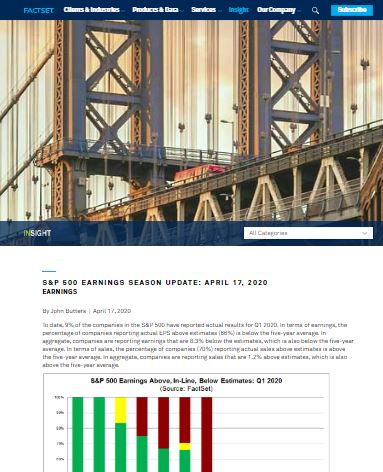Commentary 4/20/2020
The Markets= April 20, 2020
Last week’s economic data was about what you might expect in the midst of a virus crisis that has shut down businesses and forced people to stay home:
• Retail sales were down 8.7 percent in March. Retail sales track demand for everything from clothing to refrigerators. The March decline was the worst monthly performance on record, according to Ben Levisohn of Barron’s.
FEATURE ARTICLE
CLICK TO READ
Want to get this report weekly? Let us know
• Oil prices fell further. Saudi Arabia, Russia, and other nations agreed to reduce oil production, but that may not be enough to steady prices. The Economist explained, “Global demand may fall by 29 [million] barrels a day this month, three times the OPEC deal’s promised cuts.”
Want to get this report weekly? Let us know
• Earnings season began with a whimper. Just a sliver (9 percent) of the companies in the Standard & Poor’s 500 Index have reported first quarter earnings. So far, blended earnings (actual results for companies that have reported plus estimated results for companies that have not) are down 14.5 percent for the first quarter, reported John Butters of FactSet.
FEATURE ARTICLE
CLICK TO READ
Want to get this report weekly? Let us know
There were some bright spots, though, that boosted optimism in financial markets.
New York state, where more than 13,000 residents have died as a result of the coronavirus, may be entering a period of deceleration. The number of hospitalizations and deaths moved lower late last week, reported MarketWatch.
Germany announced it is slowly beginning to reopen shops and schools. Guy Chazan of Financial Times reported, “Germany has managed to contain coronavirus more effectively than other European countries, partly thanks to a comprehensive testing regime that allowed authorities to identify and isolate those infected with the virus at an early stage. It has the capacity to run 650,000 tests a week.”
Major U.S. stock markets moved higher last week and expectations for future volatility moved lower.

FIVE THINGS TO DO IF YOU JUST LOST YOUR JOB. During the past four weeks, 22 million Americans have filed for unemployment benefits. It’s an enormous number that reflects the staggering magnitude of job losses due to the coronavirus.
Job loss is painful in any circumstances. It’s particularly intimidating when it occurs in the midst of a pandemic and economic downturn. If you are recently unemployed, here are five things you can do:
1. Review your health insurance options. You may have the option to keep your employee health plan for a period of time. It’s temporary and it can be expensive. You pay the entire premium, including the amount your employer used to pay. It may be less expensive to join a spouse’s plan, if that is an option. Another alternative is to purchase a plan through the Health Insurance Marketplace. Losing a job qualifies you for a special enrollment period.
2. Get financial advice. We’ll help you evaluate your financial position by reviewing monthly expenditures and available cash, so you know how long you can make ends meet with current financial resources.
It may be possible to reduce monthly spending relatively quickly. Banks, credit card companies, and other institutions are allowing customers who call to defer payments because of COVID-19 shutdowns.
3. File for unemployment benefits. Ratchet up your patience. State unemployment benefit systems have been overwhelmed by the sheer number of applicants. Completing online forms and filing for weekly payments can take a significant amount of time, so file as soon as you can and be patient.
4. Update your resume and LinkedIn profile. Revamp your resume. Polish your LinkedIn profile. Make sure your profile is ‘public’ so people can find you. Join groups that share your interests and passions. Learn more about companies you may want to join.
5. Reach out. Start connecting with friends and colleagues. Let them know you are looking for your next opportunity.
Consider doing volunteer work or freelancing until you find a new position. Work of any kind will help you stay busy during the times you’re not hunting for a new job.
Weekly Focus – Think About It
“Far and away the best prize that life offers is the chance to work hard at work worth doing.”
–Theodore Roosevelt, 26th American President
* These views are those of Carson Coaching, and should not be construed as investment advice.
* This newsletter was prepared by Carson Coaching. Carson Coaching is not affiliated with the named firm.
* Government bonds and Treasury Bills are guaranteed by the U.S. government as to the timely payment of principal and interest and, if held to maturity, offer a fixed rate of return and fixed principal value. However, the value of fund shares is not guaranteed and will fluctuate.
* Corporate bonds are considered higher risk than government bonds but normally offer a higher yield and are subject to market, interest rate and credit risk as well as additional risks based on the quality of issuer coupon rate, price, yield, maturity, and redemption features.
* The Standard & Poor’s 500 (S&P 500) is an unmanaged group of securities considered to be representative of the stock market in general. You cannot invest directly in this index.
* All indexes referenced are unmanaged. The volatility of indexes could be materially different from that of a client’s portfolio. Unmanaged index returns do not reflect fees, expenses, or sales charges. Index performance is not indicative of the performance of any investment. You cannot invest directly in an index.
* The Dow Jones Global ex-U.S. Index covers approximately 95% of the market capitalization of the 45 developed and emerging countries included in the Index.
* The 10-year Treasury Note represents debt owed by the United States Treasury to the public. Since the U.S. Government is seen as a risk-free borrower, investors use the 10-year Treasury Note as a benchmark for the long-term bond market.
* Gold represents the afternoon gold price as reported by the London Bullion Market Association. The gold price is set twice daily by the London Gold Fixing Company at 10:30 and 15:00 and is expressed in U.S. dollars per fine troy ounce.
* The Bloomberg Commodity Index is designed to be a highly liquid and diversified benchmark for the commodity futures market. The Index is composed of futures contracts on 19 physical commodities and was launched on July 14, 1998.
* The DJ Equity All REIT Total Return Index measures the total return performance of the equity subcategory of the Real Estate Investment Trust (REIT) industry as calculated by Dow Jones.
* The Dow Jones Industrial Average (DJIA), commonly known as “The Dow,” is an index representing 30 stock of companies maintained and reviewed by the editors of The Wall Street Journal.
* The NASDAQ Composite is an unmanaged index of securities traded on the NASDAQ system.
* International investing involves special risks such as currency fluctuation and political instability and may not be suitable for all investors. These risks are often heightened for investments in emerging markets.
* Yahoo! Finance is the source for any reference to the performance of an index between two specific periods.
* Opinions expressed are subject to change without notice and are not intended as investment advice or to predict future performance.
* Economic forecasts set forth may not develop as predicted and there can be no guarantee that strategies promoted will be successful.
* Past performance does not guarantee future results. Investing involves risk, including loss of principal.
* The foregoing information has been obtained from sources considered to be reliable, but we do not guarantee it is accurate or complete.
* There is no guarantee a diversified portfolio will enhance overall returns or outperform a non-diversified portfolio. Diversification does not protect against market risk.
* Asset allocation does not ensure a profit or protect against a loss.
* Consult your financial professional before making any investment decision.
Sources:
https://www.investopedia.com/terms/r/retail-sales.asp
https://www.barrons.com/articles/the-stock-market-had-a-breakout-week-unless-you-were-a-small-cap-stock-51587167340?mod=hp_LEAD_3 (or go to https://peakcontent.s3-us-west-2.amazonaws.com/+Peak+Commentary/04-20-20_Barrons-The_Market_had_a_Breakout_Week_Unless_You_were_a_Small-Cap_Stock-Footnote_2.pdf)
https://www.economist.com/leaders/2020/04/16/the-future-of-the-oil-industry (or go to https://peakcontent.s3-us-west-2.amazonaws.com/+Peak+Commentary/04-20-20_TheEconomist-The_Future_of_the_Oil_Industry-Footnote_3.pdf)
https://insight.factset.com/sp-500-earnings-season-update-april-17-2020
https://www.marketwatch.com/story/york-coronavirus-hospitalizations-continue-to-decline-but-cuomo-calls-for-federal-testing-help-2020-04-18
https://www.ft.com/content/6751dafc-117a-47d2-ada3-44223254f2d2 (or go to https://peakcontent.s3-us-west-2.amazonaws.com/+Peak+Commentary/04-20-20_FinancialTimes-Germany_to_Relax_Coronavirus_Lockdown_Measures-Footnote_6.pdf)
https://www.barrons.com/market-data (or go to https://peakcontent.s3-us-west-2.amazonaws.com/+Peak+Commentary/04-20-20_Barrons-Market_Data-Footnote_7.pdf)
https://www.reuters.com/article/us-usa-economy/u-s-weekly-jobless-claims-seen-underscoring-deepening-economic-slump-idUSKCN21Y0CG
https://www.dol.gov/general/topic/health-plans/cobra
https://www.healthcare.gov/have-job-based-coverage/if-you-lose-job-based-coverage/
https://www.finra.org/investors/alerts/job-dislocation-managing-financial-impact-unexpected-job-loss
https://www.experian.com/blogs/ask-experian/covid-19-resource/
https://www.npr.org/2020/04/15/835174390/unemployment-money-not-reaching-millions-of-people-who-applied
https://collegegrad.com/jobsearch/35-inspirational-job-quotes-for-job-seekers
The opinions voiced in this material are for general information only and are not intended to provide specific advice or recommendations for any individual. Information regarding tax or estate planning should not be considered tax or legal advice. Consult your own tax professional or attorney regarding your unique situation. Insurance products are subject to the claims-paying ability of the insurer. Provisions and riders may have limitations, restrictions and additional charges. Subject to state availability. Certain restrictions may apply.






